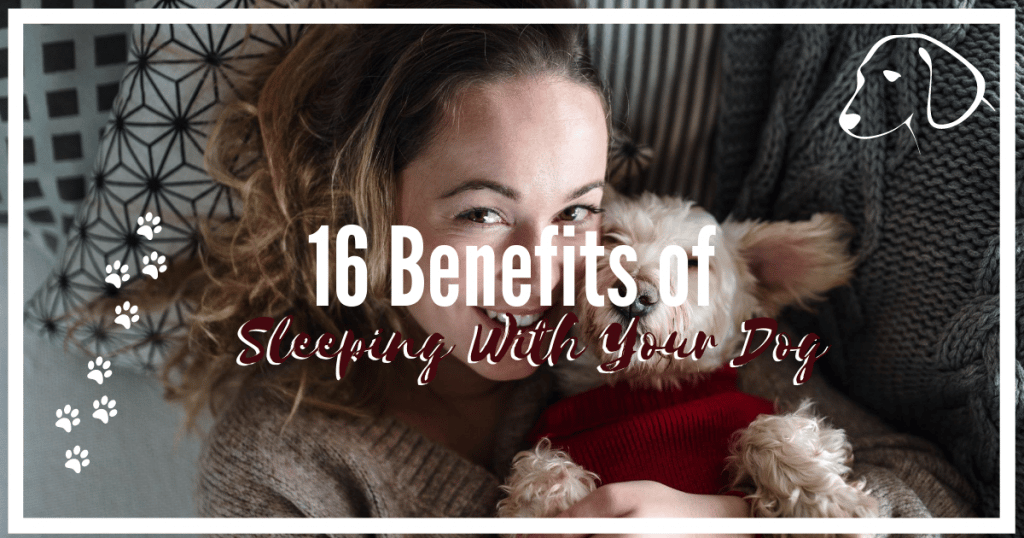Who’s sleeping in the dog house tonight? Chances are, it’s not Fido. As a matter of fact, in a survey of adult women in the United States, 55% said they share their beds with their dogs. But is it OK to sleep with your pup?
People today debate over the value of co-sleeping with a canine, but there are promising studies about the potential benefits. For example, sensing your furbaby’s heartbeat and feeling his warmth and protection can help you feel more calm and secure.
If you’re concerned that a pooch’s presence will disrupt your sleeping patterns, there’s no need to fret. Below, we’ll examine 16 reasons why sleeping with your dog can be beneficial. But first, let’s look at some information about co-sleeping with a pet.
How Common is Co-Sleeping With Dogs?
What makes dogs such good bed buddies? Part of it is their sleep cycles. In a 2018 study about women’s sleep quality as it relates to sharing a bed with their pets, the researchers reported that dogs made better sleep partners than cats or another person. Christy L. Hoffman, PhD explains that “dogs’ sleep patterns more closely coincide with sleep patterns in humans than do the sleep patterns of cats,” and for that reason, canines are less likely to disturb their masters in bed.
A Comparison of Canine and Human Sleep Cycles

The human sleep cycle has two major stages:
- NREM (Non-Rapid Eye Movement) - NREM has a group of three sub-stages that rotate between light, moderate, and deep sleep. Phases of NREM are important to restore the body.
- REM (Rapid Eye Movement) - During REM, our brains process the day’s events and organize information. This is also when we dream.
For dogs, the cycles are similar but shorter:
- SWS (Short-Wave Sleep) - SWS starts when dogs fall asleep and is comparable to NREM. The body relaxes and heart rate slows down during this phase.
- REM Sleep - Like us, dogs have a dream stage where they process information. Their brain activity tends to be more pronounced than ours, and you may observe muscle twitching and whimpering.
In her study on women’s sleep patterns, Hoffman also noted that participants “associated with stronger feelings of comfort and security,” with sharing their bed with a dog. But wait, there are other benefits as well.
A Look at Some Benefits of Sleeping With Your Dog
Helps Fight Against Depression
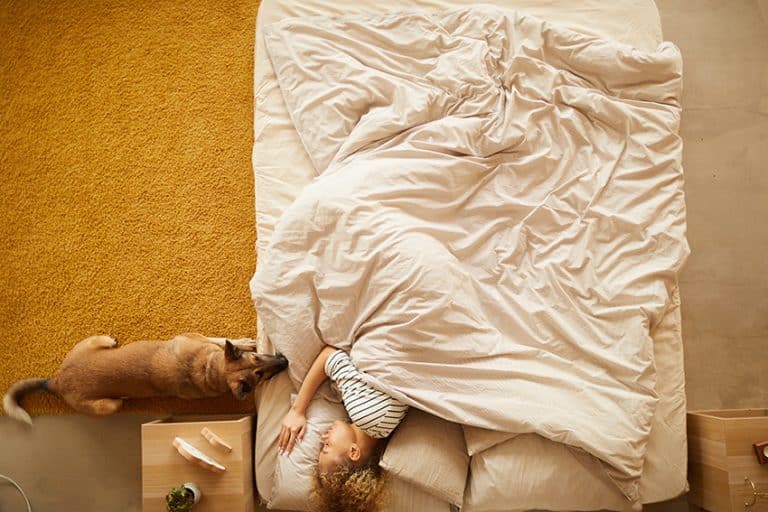
The question, then, is: does sleeping with your pup help if you’re fighting a depressive state? According to the Human-Animal Bond Research Institute(HABRI), positive interactions with your dog influence a number of physiological parameters including levels of hormones that give a sense of well-being like cortisol, oxytocin, b-endorphins, and dopamine. So, sharing your bed with your pooch can help boost your mood and stave off depression.
Increases Oxytocin Levels

Let’s take a closer look at the feel-good hormone, oxytocin. A 2018 sleep-deprivation study demonstrated that disturbed rest patterns were linked to levels of oxytocin in the blood. With elevated amounts of the hormone, people tend to experience improved sleep and better pain management. What does that have to do with our pups? In 2017, scientists published findings in Frontiers in Psychology that demonstrated a positive feedback loop involving oxytocin when humans and dogs share positive interactions that include cuddling.
Synchronizes Heartbeats
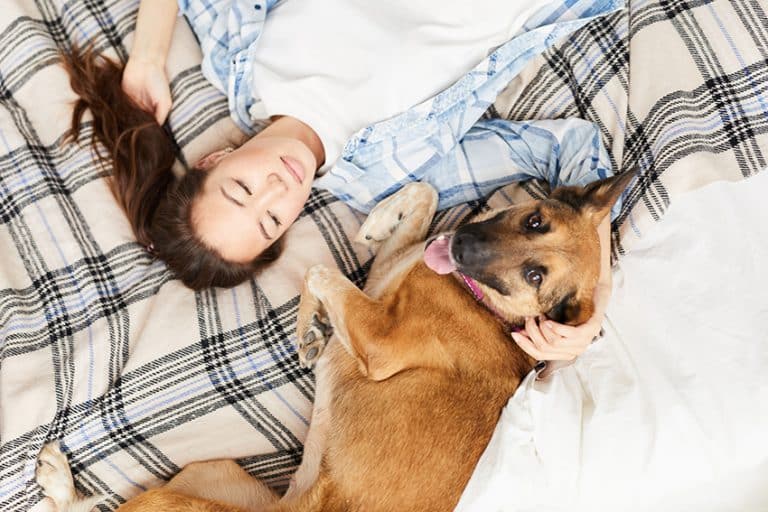
Built-in Bed Warmer
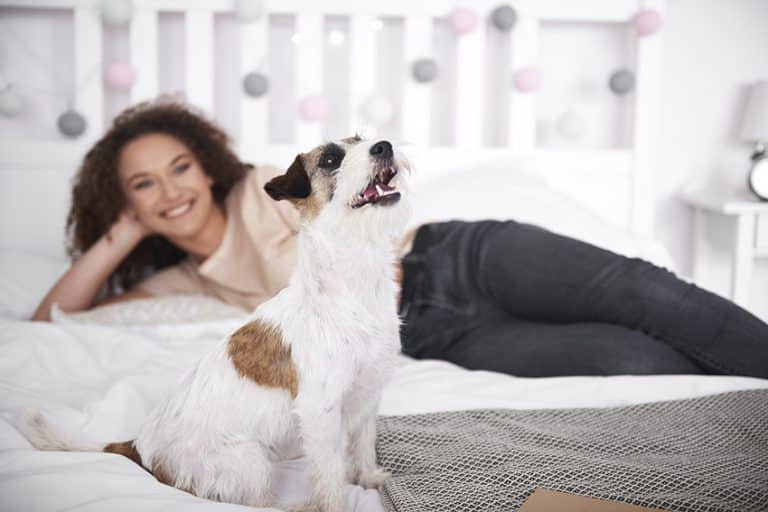
Companionship and Comfort
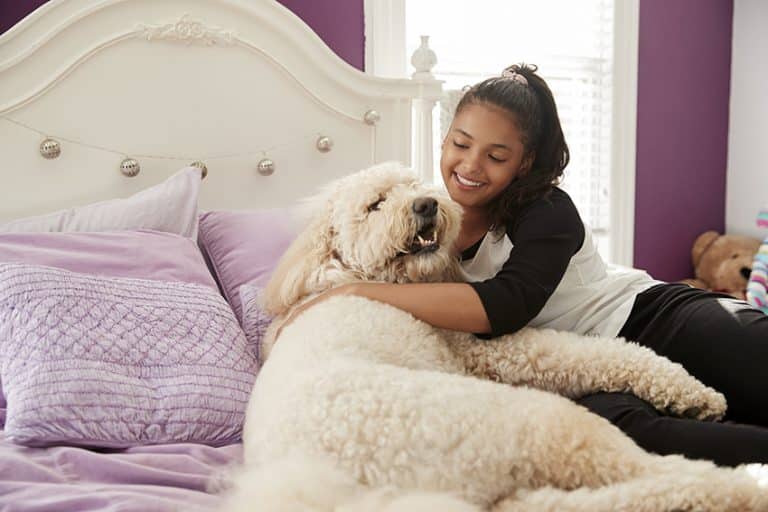
Increased Sense of Security

Of course, co-sleeping with your pooch also fosters a sense of security because you have built-in protection. You expect your light-sleeping furbaby will alert you to any unusual sounds or circumstances during the night. If your pup has a hair-trigger response to every little thing, they may hinder your sleep more than help it. In this case, you may want to give them their own bed or crate them in your room overnight.
Eases Chronic Pain
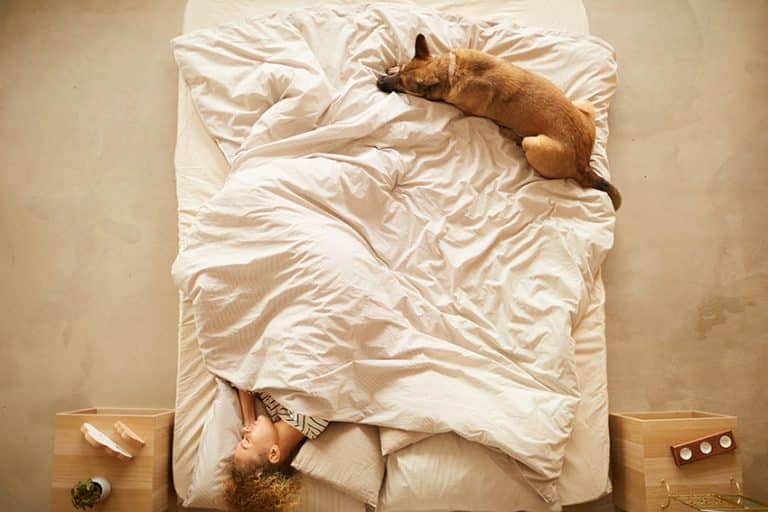
- Lower stress and anxiety levels
- Ability to fall asleep faster
- Increased relaxation
- Ability to sleep longer
- Reduced feelings of anxiety and loneliness
- Mild to moderate pain relief
According to researchers, the results could be due to an endorphin surge that occurs when you cuddle with or stroke your pooch. Of course, caring for your furbaby includes playtime and exercise, and the activity helps tire you out before bedtime.
Strengthens Your Bond and Builds Loyalty
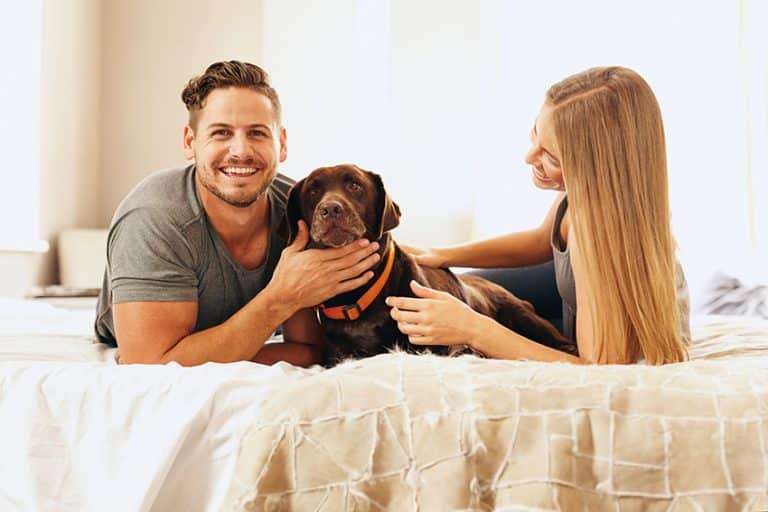
If you think that letting your pup on your bed will spoil him and cause him to think he’s your equal, it’s possible. Fortunately, it’s not usually the case unless your pooch has pre-existing behavior issues. If you have any concerns about your furbaby, talk to your vet or to a dog behavior specialist before letting him sleep with you.
Helps Ease Insomnia
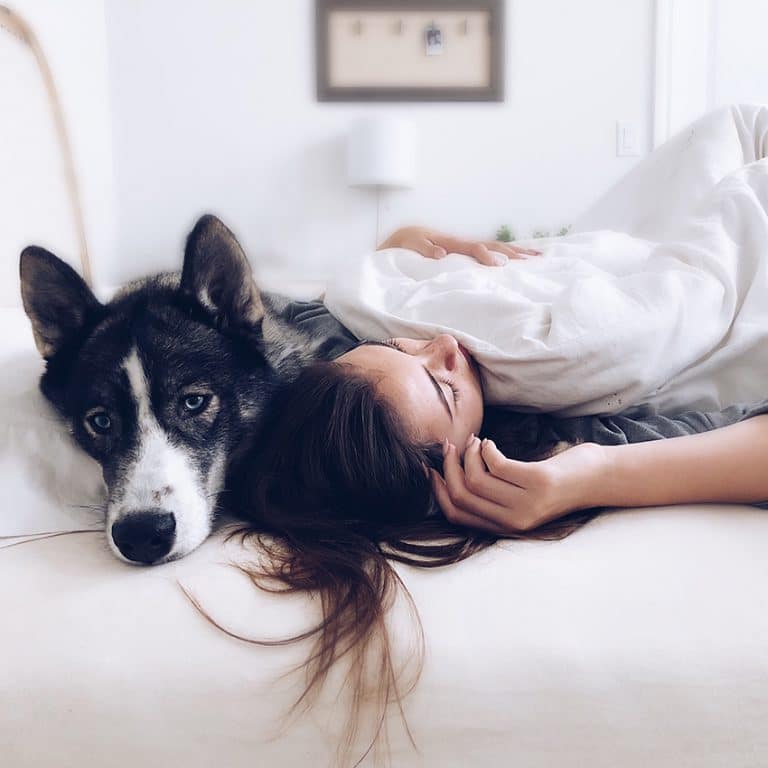
However, the benefit varies from dog to dog. Some pups may be disruptive to sleep. For example, overweight pups are prone to snoring. The extra fat around the neck can put pressure on the throat area much like sleep apnea in humans. If your pal is overweight, check with your veterinarian about a weight reduction program.
Relieves Stress

- Researchers at Washington State University found that petting a dog for as little as 10 minutes can reduce levels of the stress hormone, cortisol.
- A 2001 study demonstrated that having a dog can help reduce stress-related blood pressure.
- The Anxiety and Depression Association of America (ADAA) asserts that pets are helpful to reduce stress.
Reduces Anxiety

Reduces Loneliness
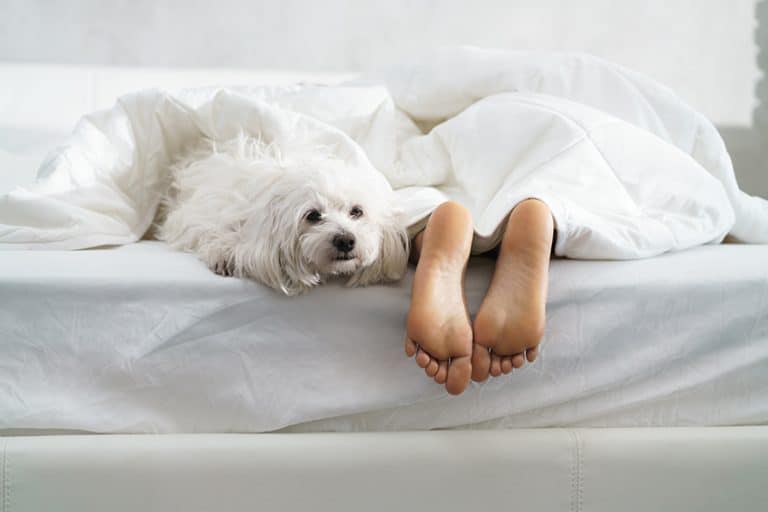
Reduces Blood Pressure

Boosts Heart Health

According to the Center for Disease Control, getting enough sleep is crucial to heart health. Adults who average less than 7 hours of quality sleep each night are more likely to suffer from conditions like high blood pressure, diabetes, and obesity all of which can contribute to heart disease. Fortunately, according to Harvard Medical School, owning a dog, “can be a reasonable part of an overall strategy to lower the risk of heart disease.” They report that studies show people who have canine companions have lower blood pressure and may have lower triglyceride and cholesterol levels. So, cuddle up with your furbaby to support a healthy heart.
Reduces Risk of Children Developing Allergies

One argument against letting Fido on your bed is that it introduces allergens into the room. While that may be a concern for adults with active allergies, the opposite may apply for children. Studies demonstrate that infants who slept with a pet were less likely to develop an allergy when they got older. It appears that exposing children to Fido early on may provide a protective effect. This can significantly reduce the risk of developing eczema and possibly other allergic reactions. So, you may want to seriously consider letting your four-footed-pal sleep in the baby’s room.
Women Sleep Better With Fido

In a study about how pets impact sleep quality, researchers surveyed 962 adult women. They found that those respondents who slept with their dogs reported fewer sleep disturbances and greater feelings of security and comfort than those who shared their bed with a cat or human partner. That’s good news for the ladies. Co-sleeping with your pooch can have rewarding results.
Bring Your Dog to Bed for the Health of It
Do you have any questions or health benefits that we missed? Leave a comment below, and we’ll update our information.

